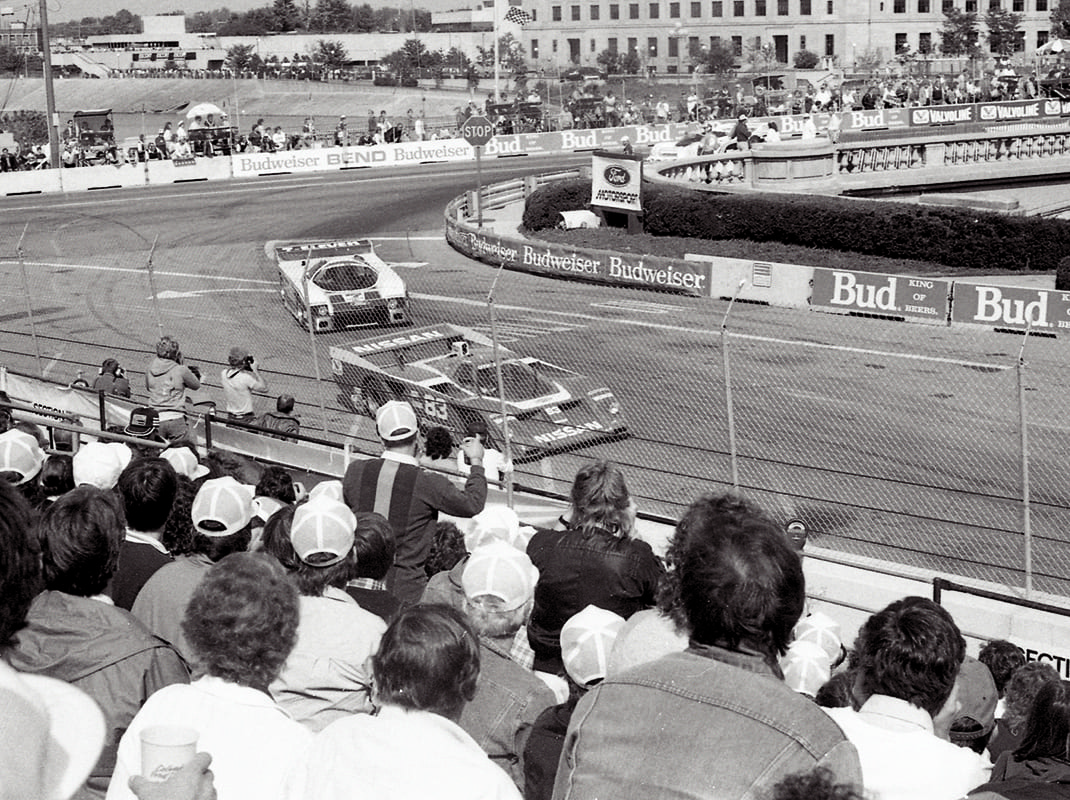In a sport centered around milliseconds, 50 years is a long time. With the politics, egos, in-fighting and changing business conditions that motorsports sanctioning bodies face, surviving 50 years is a milestone.
The International Motor Sports Ass’n is marking that milestone this year, as its first race was staged on Oct. 19, 1969.
The sanctioning body is making the most of the occasion and celebrating its storied history. In reality, a lot of it was glorious and some of it was tumultuous. And if the truth is told, no one was talking about IMSA much at all in 2012 when the American Le Mans Series and the Grand-Am Road Racing Ass’n were battling for supremacy.
The ALMS was formed in 1999 and Grand-Am in 2000. Although both had their strong points, sports car racing learned the same lesson Indy car racing learned — it’s better to work together than separately.
Thanks to the civility and big-picture thinking of Jim France and Don Panoz, NASCAR’s Grand-Am organization and the ALMS merged in 2014 to form the TUDOR United SportsCar Championship, with IMSA as its sanctioning body.
[subscribers_only]
Today might not be the “golden years” old-time IMSA fans remember fondly, but sports car racing in North America is healthier than it’s been at many other times during IMSA’s 50-year history.
IMSA sanctions seven series — its flagship IMSA WeatherTech SportsCar Championship, the IMSA Michelin Pilot Challenge, IMSA Prototype Challenge, Porsche GT3 Cup Challenge USA by Yokohama, Porsche GT3 Cup Challenge Canada by Yokohama, Super Trofeo North America and Ferrari Challenge North America.
Sports car racing’s strength has always been tied to manufacturer support and right now that’s also better than it’s been in the past.
Fourteen manufacturers competed in this year’s Rolex 24 At Daytona during January — Acura, Audi, BMW, Chevrolet, Cadillac, Ferrari, Ford, Lexus, Lamborghini, Mazda, Mercedes-AMG, Nissan, Oreca and Porsche. Five additional manufacturers were represented in the IMSA Michelin Pilot Challenge season opener at Daytona — Alfa Romeo, Aston Martin, Honda, Hyundai and McLaren.
Last year, 11 of the 13 manufacturers that competed in the IMSA WeatherTech Championship won at least one race and every manufacturer had at least one podium finish. There were 20 different teams and 53 different drivers that earned victories, with dozens more celebrating on the podium.

In short, the racing is very, very good.
That would make the founders of IMSA — John and Peggy Bishop and NASCAR’s Bill France — very happy. The Bishops were committed to four main things: controlling costs, close competition, not forgetting about the needs of the privateer teams and treating people nicely.
John Bishop was a former executive director of the Sports Car Club of America who wanted sports car racing to be more professional. France saw IMSA as a way to get in on some of the action being enjoyed by the SCCA, which sanctioned Trans-Am, Can-Am and some other series.
France owned 75 percent of the IMSA stock initially and the Bishops owned the rest. Later, France brought in new investors to take over part of his stake because the going wasn’t exactly smooth that first year.
Ironically, the first IMSA race wasn’t even a sports car race on a road course; it was a formula car race (Formula Fords and Formula Vees to be exact) on a five-eighth-mile oval at Pennsylvania’s Pocono Raceway. It paid $3,000 to win, the distance was 200 laps and about 350 people showed up.
Two weeks before the first IMSA race it was almost canceled, as SCCA threatened tracks and workers with disbarment from the SCCA if they participated in any IMSA events. Track owner Dr. Joe Mattioli leased the track directly to IMSA and hoped it wouldn’t cost him his future SCCA dates. Bishop borrowed $10,000 to lease the track and guarantee the purse and called just about everyone he knew to help.
The Bishops made sure everyone was treated nicely. Rather than standing in long tech lines, IMSA officials did their tech work where each car was parked in the infield. And the officials were cordial, something that couldn’t always be said at an SCCA event. France flew in to give moral support.
Many of the drivers had never driven on an oval. Skip Barber, Bill Scott, Jim Jenkins, Fred Opert and George Alderman were some of the drivers on hand. Jim Clark (not the famous British driver) was declared the winner, but a scoring error was found and Jenkins actually won, although the mistake was never corrected.
[/subscribers_only]
